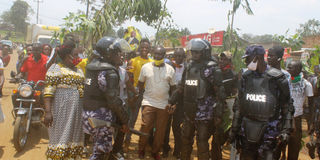Prime
Donors urge govt to tackle violence ahead of polls

Police protect supporters of Mr Davis Kamukama at Kibiito Trading Centre, Bunyangabu District, during last week’s NRM party primaries. Mr Kamukama defeated Defence minister Adolf Mwesige in the race for the Bunyangabu County MP seat. PHOTO | ALEX ASHABA
What you need to know:
Dr Roswitha Kremser, the head of Austrian Embassy Development Cooperation, said although Uganda has a conducive legal and policy framework that supports effective implementation of women, peace and security (WPS) agenda, a lot is needed to protect them against conflict and violence
Donors yesterday outlined challenges facing the country ahead of the 2021 General Election, warning that women and children remain the most vulnerable in this season.
Dr Roswitha Kremser, the head of Austrian Embassy Development Cooperation, said although Uganda has a conducive legal and policy framework that supports effective implementation of women, peace and security (WPS) agenda, a lot is needed to protect them against conflict and violence.
Dr Kremser said an analysis of the National Action Plan (NAP) I and II agendas showed that women were still exposed to inequalities, and urged stakeholders to work together in peace building.
She made the remarks during a meeting with donors organised by UN Women in conjunction with Ministry of Gender, Labour and Social Development in Kampala yesterday.
Dr Kremser said Uganda still faces inter-ethnic rivalries, radicalisation and violent extremism, conflicts over natural resources such as pasture, agricultural land and water which disadvantage the women.
Efforts
Mr Christopher Kibazanga, the Minister of State for Defence and Veteran Affairs, said they were working to outlaw some cultures that do not promote women rights.
“We are working to outlaw some of our cultures that push women behind doors making them shy not to stand up to speak about issues that affect them,” Mr Kibazanga said.
He urged government to provide resources in social services to ensure the ordinary citizens access the basics to avoid conflict.
“The moment there are issues in the democratisation and the freedoms are infringed upon, then you create conflict. In order to keep the soldiers in the barracks, we must get the parameters of democracy and freedoms to human rights right and politics right. Democracy is about sharing resources, identifying where they are.
“Get the politics right, there will not be war. If government doesn’t have the resources, conflict will start. Concentrate the low resources to provision of services so that the impact of poverty is not felt much,” he added.
Ms Angella Nakafero, the Gender commissioner, said they need Shs90.6 billion to prevent and resolve conflict under the NAP III agenda.
Dr Maxime Houinato, the UN Women country representative, said the effective implementation of NAP I and II was affected by of lack of clear financing mechanism which the NAP III strategy seeks to address after Cabinet approval.



